The music entertainment business is exciting and has plenty of lucrative career opportunities.
But if you want to stand out in this competitive industry, you’ll need a resume that hits all the right notes.
To help you achieve this, we’ve created a music entertainment resume example you can use that will inspire your own.
Contents
|
Music Entertainment Resume Example
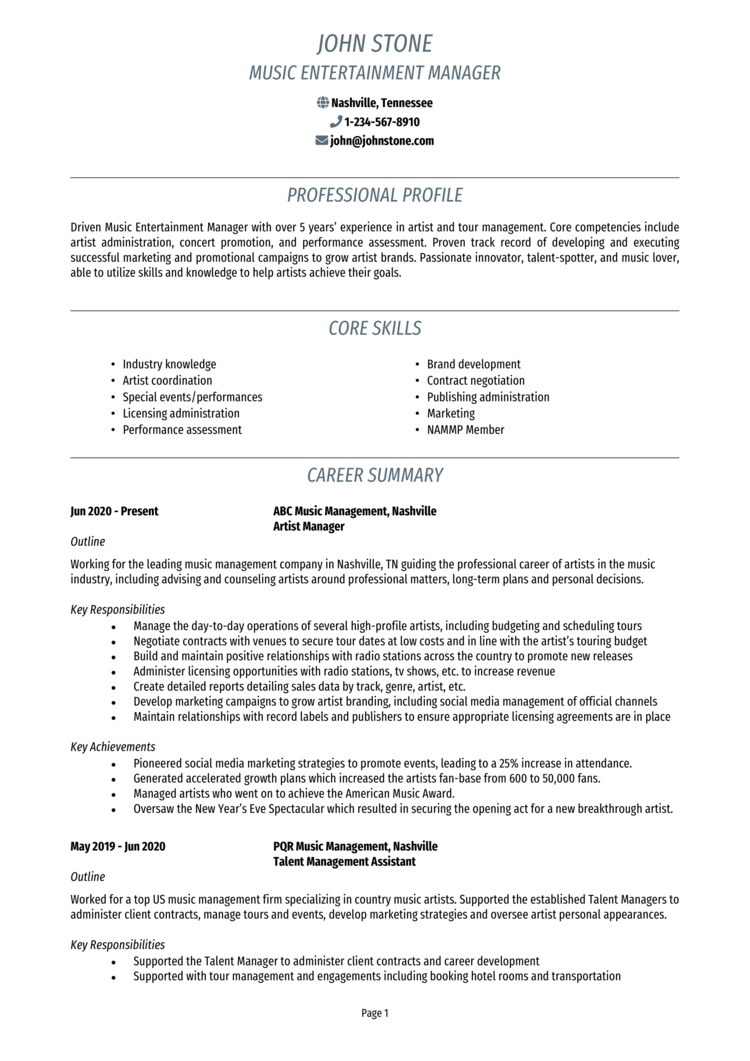
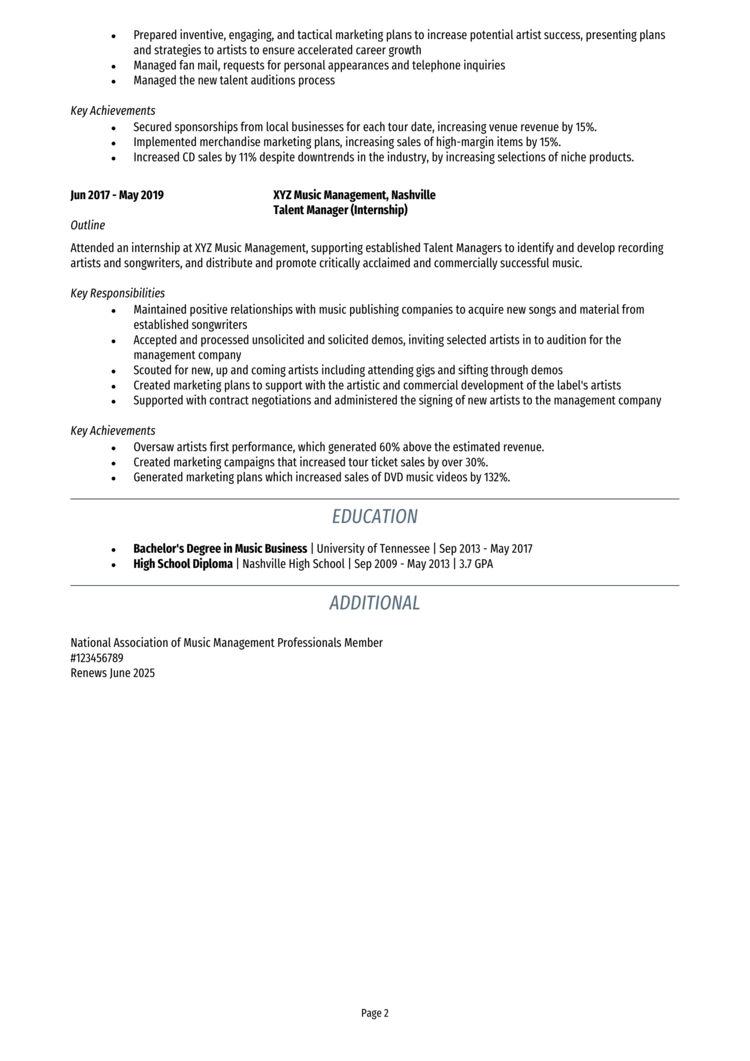
This Music Entertainment Manager resume example shows you the most effective layout for a modern resume, along with the type of content you need to include.
Stick closely to these guidelines as you write your own resume, to maximize your chances of getting responses, interviews and job offers.
Now lets dive into the details of how you write your own eye-catching resume…

Music Entertainment resume layout and format
Your resume layout and format will play a big role in helping hiring managers to take notice of your resume and stay glued to it.
Shoot for a simple yet professional look to ensure you make a strong first impression, and organize the page in a way that is easy for readers to digest the information.
The following formatting tips should help.
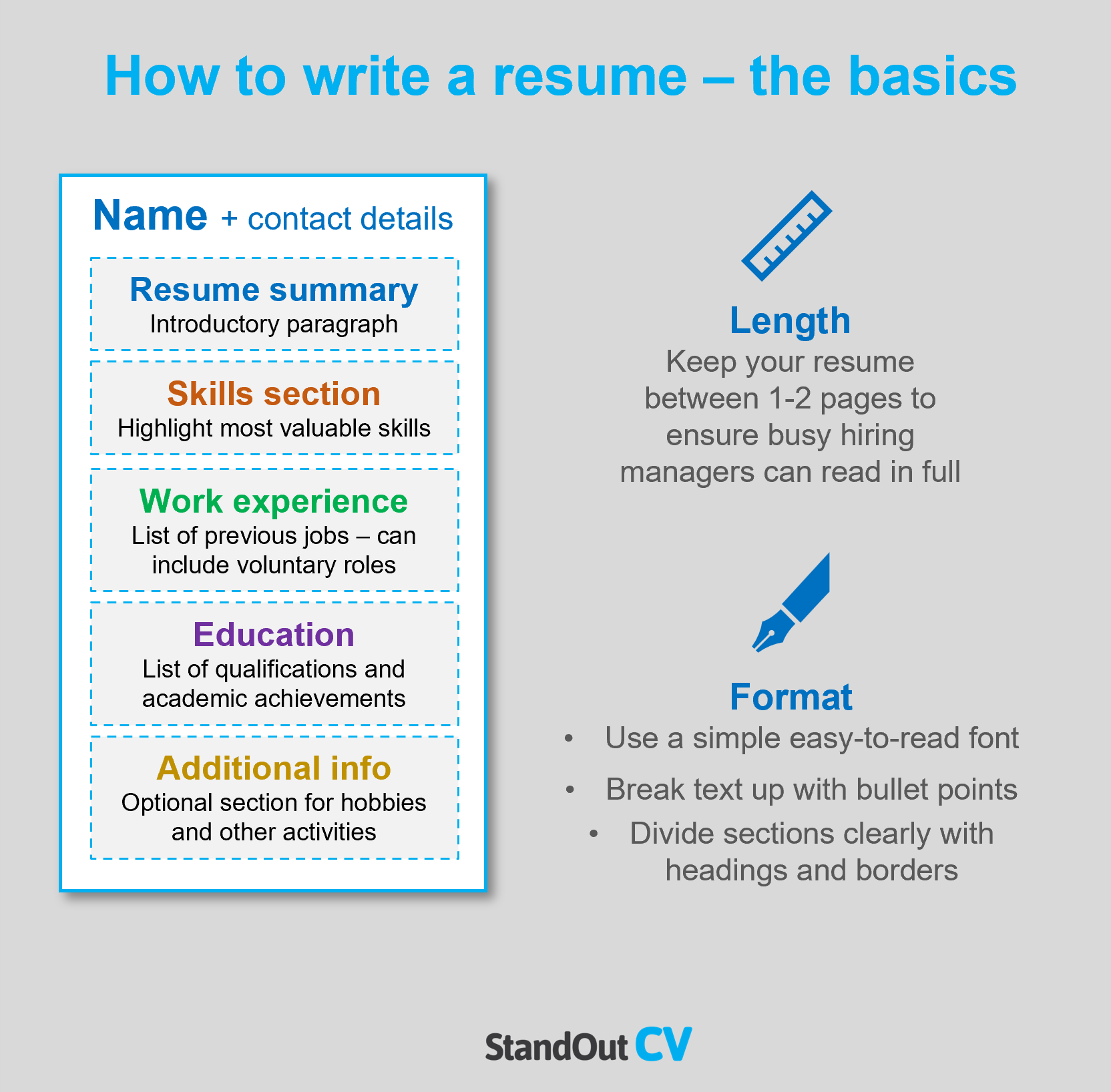
Resume formatting tips
- Length: Attention spans in recruitment are notoriously short, so keep your resume short and sweet. There’s no exact rule for resume length, but aim for 2 pages or less if you want to ensure yours gets read in full.
- Font and text: Simplicity a pleasant reading experience are crucial if you want to highlight your most valuable skills to recruiters. Use a clear font (avoid fancy ones) and break up the text in your resume with bullet points to ensure information can be easily consumed.
- Design & structure: Hiring managers should be able to skim through your resume easily and pinpoint the information they want quickly. To help them do this, organize the page into clear sections with bold headings and dividing borders. The design should be clutter-free and professional-looking, with a calm color scheme.
- Photos and images: It’s not mandatory to add a photo to your resume in the USA but it if you’re applying to organizations within the creative fields, it can be beneficial.
Quick tip: Formatting a resume to look professional can be difficult and time-consuming. If you want to create an attractive resume quickly, try our quick-and-easy Resume Builder and use one of their eye-catching resume templates.
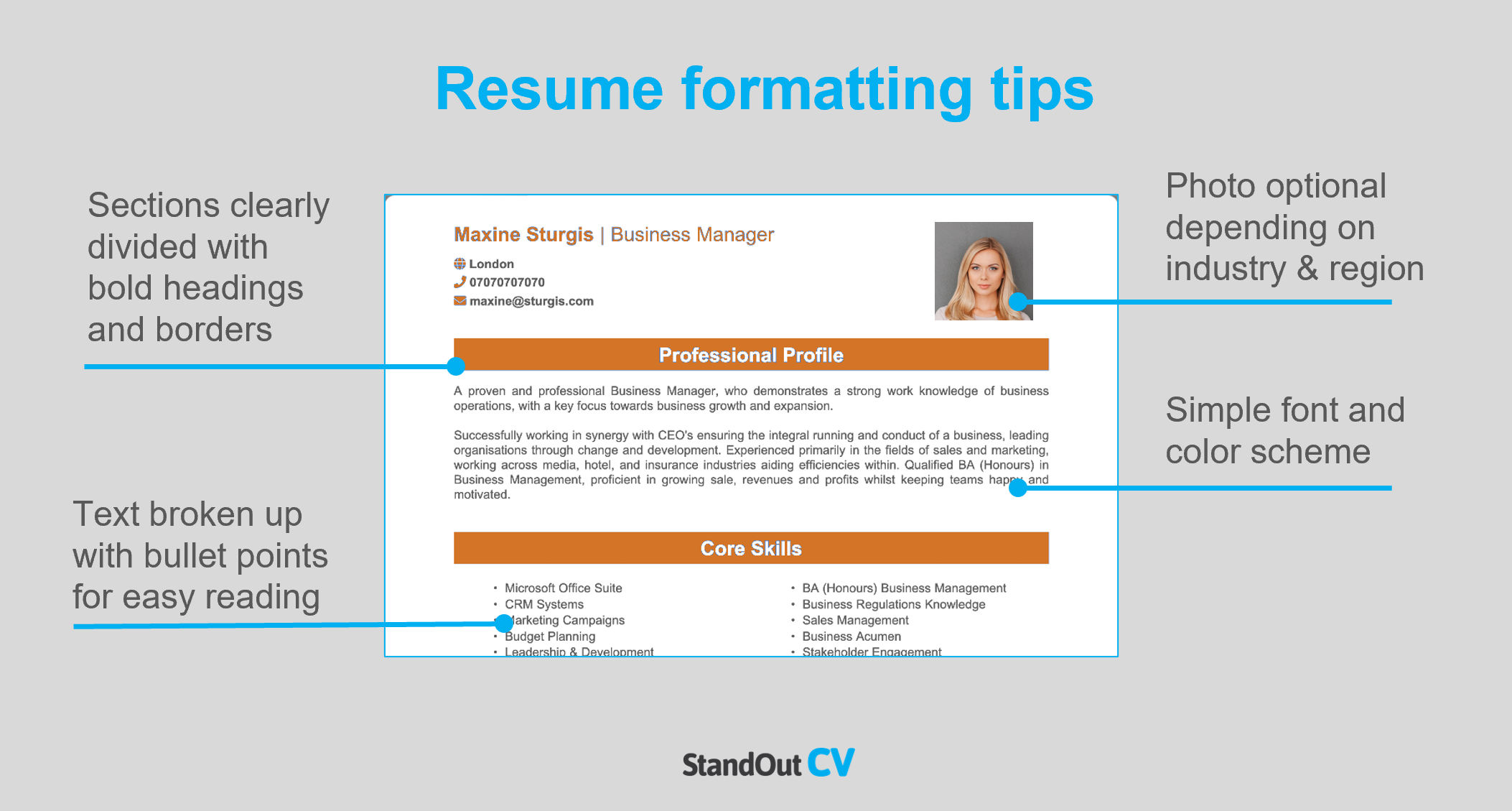
Resume layout
Add the following sections when you write your resume.
- Name and contact details – Add to the very top of your resume to introduce yourself and make it super-easy for recruiters to get in touch.
- Resume summary – Reel hiring managers in with an “elevator pitch” style paragraph which sums up your suitability for the job.
- Skills section – A short and sharp list of your most important skills, that can be quickly skim-read.
- Work experience – List your previous jobs (from newest to oldest) detailing the skills learnt and applied in each.
- Education – List your qualifications and professional training.
- Additional info – If it helps your application, you can add an extra section for things like hobbies and interests.
Now here’s exactly what you should include in each of these sections in your resume.
Resume Contact Details

Keep your contact details short to save resume space and include the following.
- Name and profession title
- Cell phone number
- Location – Add your local area such as Silicon Valley or New York, unless you are looking for work in a different location
- Email address – Keep it professional and don’t use an old address that you thought was cool in high school, but now looks a bit embarrassing.
You can add a link to your LinkedIn profile if you have one – you do not need to include personal details like date of birth or marital status.
Music Entertainment Resume Summary
Your resume summary is like an elevator pitch. It’s your chance to sell yourself to employers within a short space of time.
Achieve this by summarizing your skills and expertise, whilst highlighting your abilities that closely match the jobs you are aiming for.
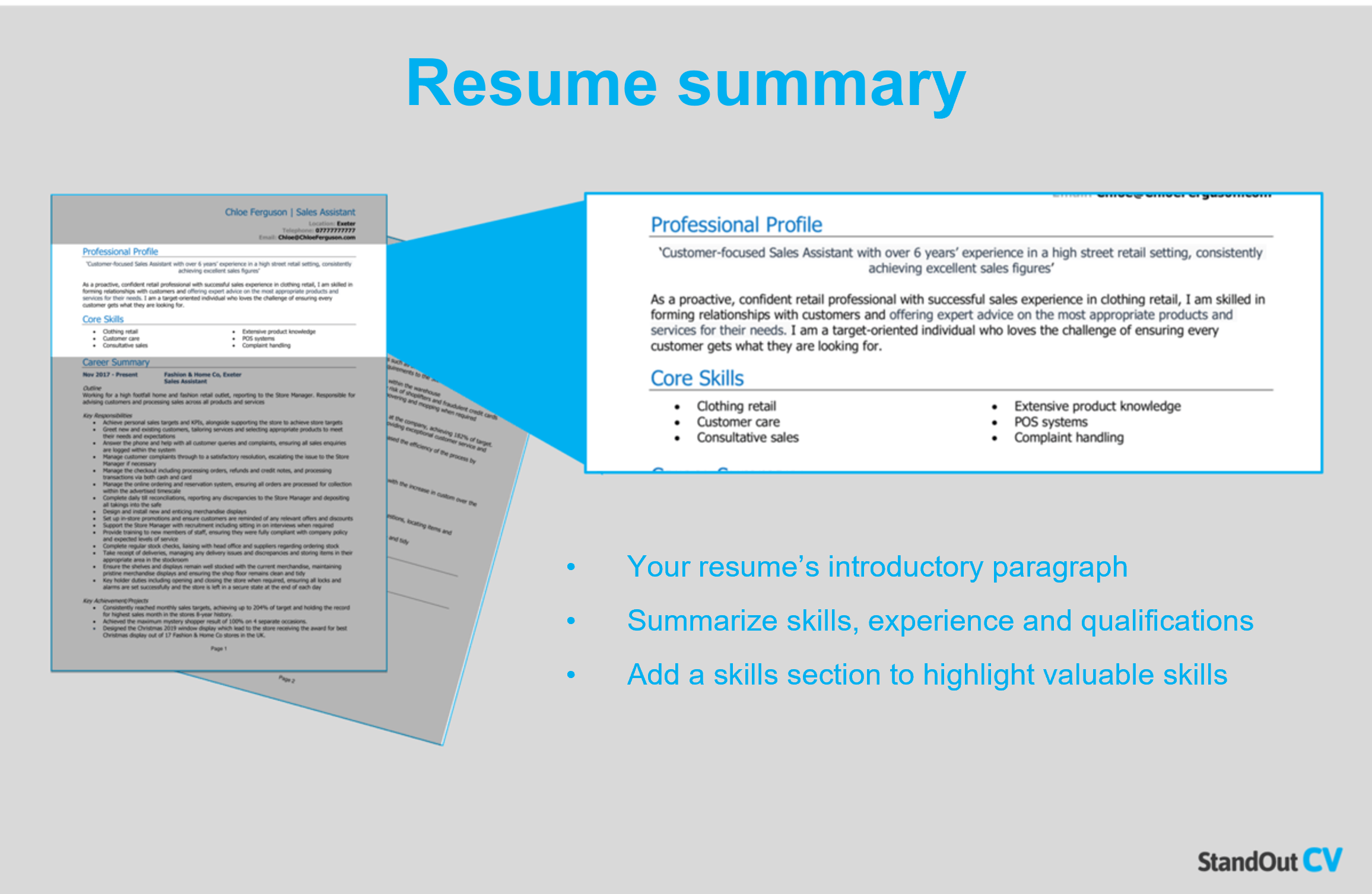
Tips for creating an strong resume summary:
- Keep it brief: You only have a few seconds to grab a recruiters’ attention and make them commit to your resume, so keep your summary between 4 – 7 lines.
- Tailor it: Tailor your resume to your target jobs by studying the job description and adding as many matching skills as you can.
- Avoid cliches: You may be a “team player who always give 110%” but generic phrases don’t tell employers much about you in reality – stick to factual information.
Example resume summary for Music Entertainment
What to include in your Music Entertainment Resume summary?
- Summary of professional experience: Summarize the type of work you have done in the past and the benefits you have delivered for the organizations you worked at.
- Relevant skills: Include your skills which are hyper relevant to jobs in the music/entertainment industry to instantly show your suitability.
- Essential qualifications: Mention any music/entertainment management qualifications that are important to your profession in the summary briefly, to show you are qualified to carry out the role.
Quick tip: Choose from hundreds of pre-written summaries across all industries, and add one to your resume with one click in our quick-and-easy Resume Builder. All written by our recruitment experts and easily tailored to suit your unique skillset.
Core skills section
Sitting just underneath your resume summary, your core skills section gives recruiters 4-10 of your most in-demand skills in just a glance.
As jobs in Music Entertainment may get hundreds of applications, this is a great way to stand out and quickly grab hiring managers’ attention.
It should be made up of 2-3 columns of bullet points and highlight attributes that are hyper-relevant to the jobs you are aiming for.
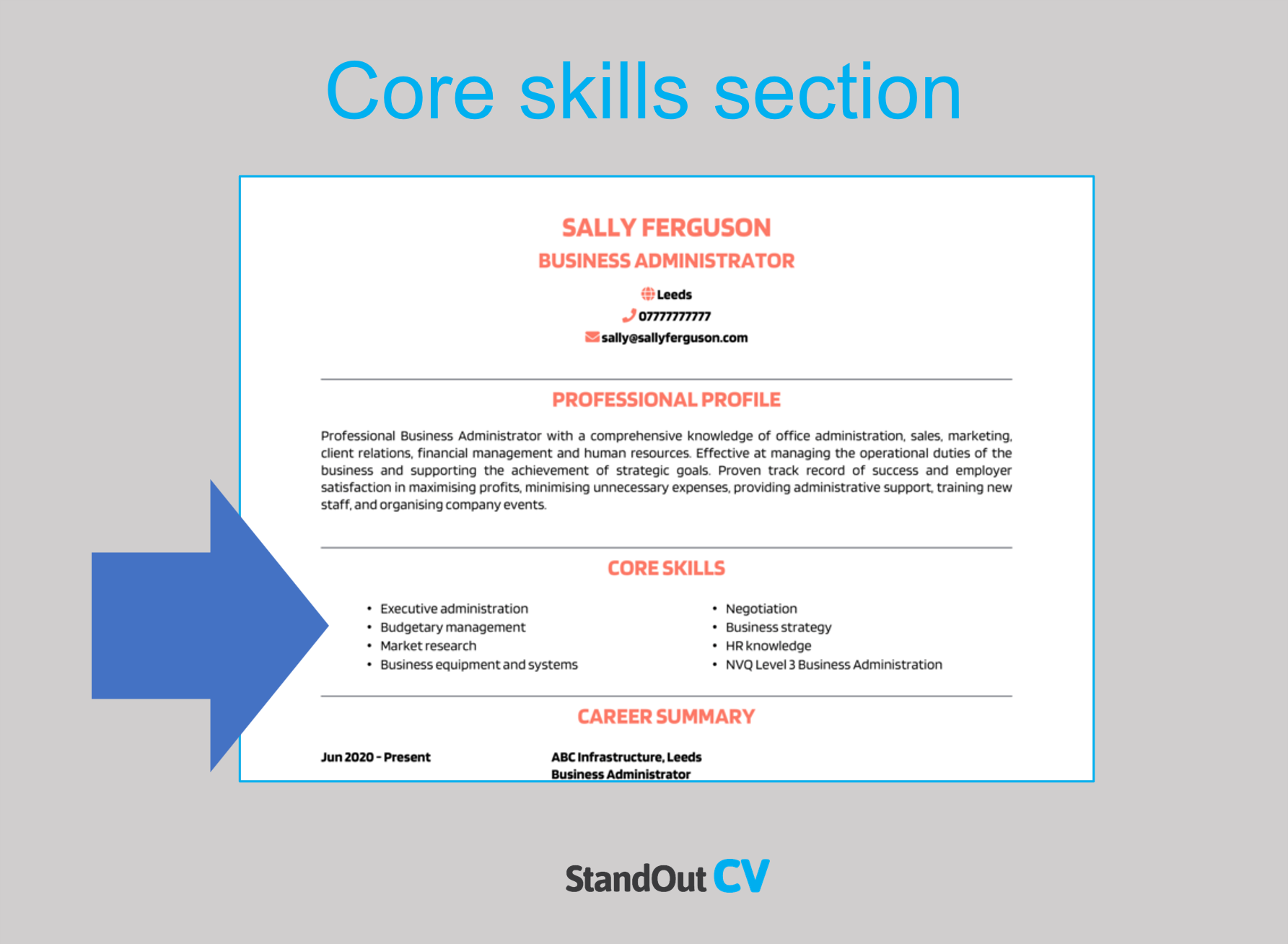
Best skills for your Music Entertainment resume
- Brand development – Utilizing effective branding strategies to create a unique and memorable image for each artist.
- Artist coordination – Ensuring all artists are in the right place at the right time, singing the right songs and wearing the right wardrobe.
- Contract negotiation – Discussing and agreeing to obligations such as minimum gig rates, royalty payments, set termination clauses etc., ensuring the Artist is satisfied while maintaining company profits.
- Special events/performances – Coordinating special events and live performances, ensuring the wardrobe, band etc are in position and everything is ready to go before the Artist makes their way to the stage.
- Licensing administration – Implementing licences for all artist music used by businesses, online, in broadcasts and film, for live performances and as recorded products.
Quick tip: Our quick-and-easy Resume Builder contains thousands of in-demand skills for every profession that can be added to your resume in seconds – saving you time and greatly improving your chances of landing job interviews.

Work experience section
Once you’ve got recruiters interested with your impactful summary, your work experience is where the real detail will lie.
Lay out your previous jobs from current to oldest, detailing what you contributed and achieved in each one.
If you’re highly experienced you can cut this section down to your most recent few years of work, but if you are junior you can bulk this up with voluntary work and college placements.
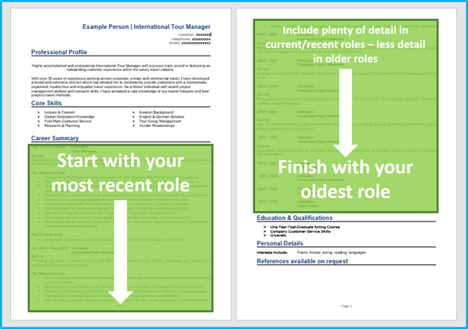
Structuring your job descriptions
Resume job descriptions contain lots of information, so its crucial to structure them well.
Use the structure below to ensure hiring managers can consume the information easily.

Job outline
Start with a 1-2 sentence outline of the role, summarizing what the goal of your position was, who you reported to (or managed) and the type of organization you worked for.
Key responsibilities
Next, write up a punchy list of your daily duties and responsibilities, using short bullet points.
Describe how you apply your skills and contribute to the running of the employer’s business – highlighting skills which are applicable to your target jobs.
Key achievements
Finish each role by highlighting some impressive achievements you made whilst in the role.
Anything that benefited the employer can be included from making financial savings, to winning new customers.
Quantify your achievements with facts and figures if you can, e.g. “reduced call wait time by 10%”
Example job for Music Entertainment resume
Outline
Working for the leading music management company in Nashville, TN guiding the professional career of artists in the music industry, including advising and counseling artists around professional matters, long-term plans and personal decisions.
Key Responsibilities
- Manage the day-to-day operations of several high-profile artists, including budgeting and scheduling tours
- Negotiate contracts with venues to secure tour dates at low costs and in line with the artist’s touring budget
- Build and maintain positive relationships with radio stations across the country to promote new releases
- Administer licensing opportunities with radio stations, tv shows, etc. to increase revenue
Quick tip: Create impressive job descriptions easily in our quick-and-easy Resume Builder by adding pre-written job phrases for every industry and career stage.
Education resume section
Towards the bottom of your resume, add your education section.
Here you should list your professional qualifications and academic record, such as high school diplomas or college degrees.
If you have lots of work experience, you can keep this section brief (because recruiters will be more interested in your career. If you have little/no experience then you should bulk this section up with plenty of detail.
Additional info for your resume
The additional info section is optional but can be useful if you have anything else to add that could benefit your application.
For example ,you may have some hobbies and interests that are relevant to your job – or you might have awards or publications to shout about.

Writing your Music Entertainment resume
Following the steps in this guide will help you to create a winning Music Entertainment resume and bag lots of interviews.
If you want some more help through the process, try our quick-and-easy Resume Builder for expert guidance and tons of pre-written resume content.
Good luck with your job search!